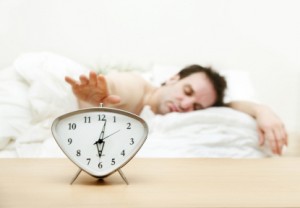Are you a night owl who struggles to put down the fork in the wee hours of the morning? New research shows that the later we stay up, the likelier our bellies and our brains are to start craving junk food, which gives us all the more reason to hit the hay earlier.
Combined research specifically shows that sleep-related hunger and food cravings are caused in part by hormones that help drive our appetite. These tendencies, researchers propose, may be what’s leading to weight gain. When our bodies are sleep deprived, areas of the brain are stimulated that seek out pleasure – for some in the form of junk food. Sleep deprivation may also contribute to weight gain since drowsiness can fog our brain’s ability to squelch these cravings.
One of the studies, which took place at Columbia University, utilized functional magnetic resonance imaging (fMRI) to monitor the blood flow in the brains of 25 volunteers. Researchers used the scans to compare brain activity following a normal night’s sleep – about eight hours – to a night in which they were allotted just four hours.
Researchers showed participants images of unhealthy foods and healthy foods while monitoring the brain’s activity. And they found that the brain was more active in cravings and reward when participants were sleep-deprived, as opposed to when when they had more rest. This became especially apparent when they were shown images of unhealthy foods.
Lead researcher, Marie-Pierre St-Onge, Ph.D., reported that “The pleasure-seeking parts of the brain were stimulated after an individual was sleep deprived. People went for foods like pepperoni pizza, cheeseburgers and cake.”
Of the results, St-Onge and her colleagues speculate that when people are sleepy, they gravitate toward higher-calorie foods because their bodies are in need of extra energy to help them make it through the day. “We hypothesize that the restricted-sleep brain reacts to food stimuli as though it [were] food deprived,” she said.
In a similar study, researchers at the University of California, Berkeley, surveyed 23 young adults who were considered healthy. Participants were asked to rate their desire for various foods while undergoing fMRI. Researchers found that the participants were more likely to have a strong preference for unhealthy foods when they’d been awake for 24 hours, as compared to when they had more rest. Researchers suspect this happened because when our bodies are sleep deprived, the brain exudes diminished activity in the areas that enable complex decision-making, which can lead some to be drawn to high-calorie, fatty foods.
These studies were presented at the annual meeting of the American Academy of Sleep Medicine. While researchers found the results telling, further research needs to be completed to confirm the findings as fMRI studies have only been given mild credibility as they don’t always translate to real-world behavior.
In the meantime, aiming to get eight hours of rest a night is always a good idea for optimum health. Check out our article on the importance of sleep for good health for several tips on how to get a better night’s rest.
Also Read:
Good Sleep and Good Workouts go Hand in Hand
Lack of Sleep Tied to Teen Obesity
source: CNN
